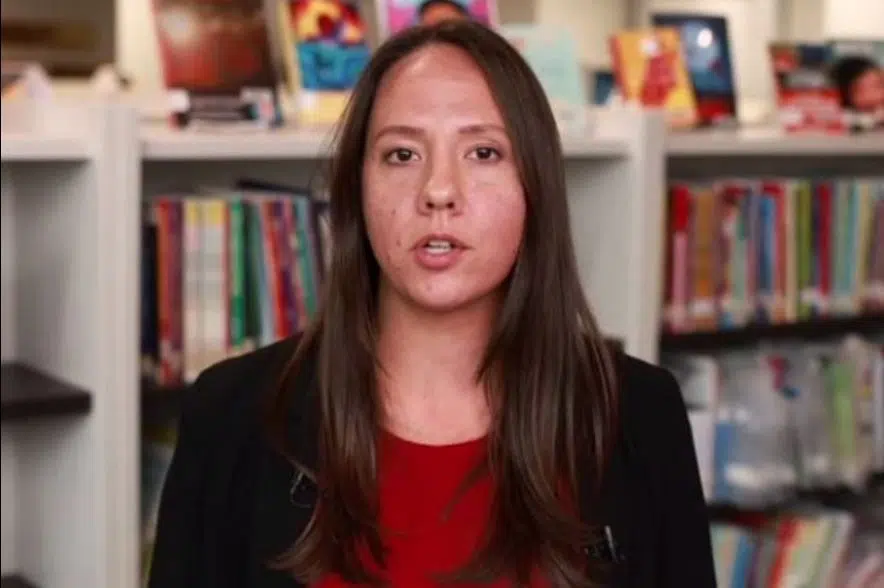A vote by Saskatchewan teachers could have an effect on classrooms in the province.
On Tuesday and Wednesday, teachers across the province are to vote on possible sanctions, which could result in job action, according to the Saskatchewan Teachers’ Federation (STF).
STF president Samantha Becotte said it got to this point of tension due to the government. She said over nine days of bargaining, the government didn’t budge.
STF president Samantha Becotte speaks to media in an online news conference on Sept. 20, 2022. (Screenshot)
“We continue to go to the table and we continue to hear ‘No,’ or, ‘We’re not interested,’ or, ‘That’s not going to be bargained,’ and so we have in effect reached an impasse,” she said.
As a result, the STF is moving forward with the conciliation process and the provincial executive, along with the teachers’ bargaining committee, have also made the decision to hold a sanctions vote.
Becotte said the sanctions vote is another way to apply pressure to the government and show that teachers are serious about wanting improvements to their working conditions.
“It’s disappointing to see that this government isn’t willing to have a conversation and start to address those significant needs across the province. Teachers have had enough. They’ve said enough is enough and they’re ready to take action,” she said.
The sanctions could be a variety of actions, said Becotte.
“It could be anything from withdrawal of voluntary services. It could be a work-to-rule job action. It could be a full withdrawal of professional services or a strike,” she said.
A withdrawal of voluntary services means extracurricular activities to which teachers volunteer their time like sports and clubs would come to a pause. That won’t have a direct impact on the day-to-day function of the classroom. But Becotte said extracurricular activities are important to building the school community.
Work to rule is similar to withdrawal of voluntary services but it also includes limiting working hours.
“Teachers put in tons of work outside of the day to prep and plan their classes, so (work to rule) would be limiting those hours. Teachers would only be working 15 minutes before the school day starts and 15 minutes after the school day ends. They also wouldn’t be working or providing service over their lunch hour,” she said.
On the most extreme end, teachers could opt to strike. That would mean no classes for students.
Becotte hopes the vote doesn’t get to that stage.
“We are hoping that the government comes back to the table and negotiates with us. If it does get to that point, it is the government’s actions that have forced us to take these drastic steps. It is not something that we aim (for); we aim to have a negotiated agreement,” she said.
If teachers vote for the sanctions, there isn’t a timeline on when they would begin and how long they would last.
Becotte said it all depends how long it takes the government to come back to the table.
She said sanction votes are becoming more common in Saskatchewan. She said the government is not allowing for a back-and-forth conversation.
“That’s not how negotiations work. That’s a take it or leave it. That’s not how it should be handled. There needs to be a give and take,” she said.
Government’s response
Education Minister Jeremy Cockrill and NDP Leader Carla Beck have previously addressed this issue.
More recently, Cockrill posted a video on X, formerly known as Twitter, discussing the provincial government’s stance on the subject. In the video, Cockrill said he’s concerned over a possible strike vote.
“The intention of this strike vote is to jeopardize those in-class and extracurricular activities from happening within our schools,” he said. “We’ve been clear that we’re at the bargaining table with a fair deal for teachers.
“We are ready to continue bargaining because we want to ensure predictability for teachers, for families and for students across our province. We want to ensure that teachers can continue to do what they do best and our children can continue learning in the classroom, competing on the field, and developing their talents and skills.”
The best deals are negotiated at the bargaining table.
Your Government-Trustee Bargaining Committee (GTBC) remains at the table ready to negotiate.
Let’s get back to working on a fair deal for teachers. pic.twitter.com/nPHpsgz0Md
— Jeremy Cockrill (@jeremycockrill) October 22, 2023
On Friday, Cockrill and the provincial government passed the Parents’ Bill of Rights, enacting policies about sexual education and the use of pronouns. Becotte previously called the policies “outdated.”
The sides also have sparred over billboards the government put up across the province which suggest Saskatchewan teachers are among the highest-paid in Western Canada with average salaries of $92,000 per year. The union said it takes 10 years before the average Saskatchewan teacher makes $92,000 year.








